| Listing 1 - 10 of 45 | << page >> |
Sort by
|
Book
ISBN: 0952791609 9780952791607 Year: 1996 Publisher: East Haddon, Northants SEK Publications
Abstract | Keywords | Export | Availability | Bookmark
 Loading...
Loading...Choose an application
- Reference Manager
- EndNote
- RefWorks (Direct export to RefWorks)
International economic relations --- European Union --- European federation. --- 339.92 <4> --- European Union. --- Europe --- -European federation --- -Federation of Europe --- Pan Europa movement --- Paneuropean federation --- United States of Europe (Proposed) --- Federal government --- Regionalism (International organization) --- Economische samenwerking en integratie. Tolunie--Europa --- Economic integration --- 339.92 <4> Economische samenwerking en integratie. Tolunie--Europa --- -Federal government --- Federation of Europe --- European federation --- E.U. --- Economic integration.
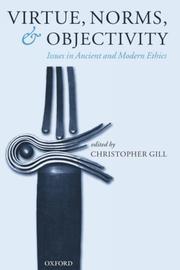
ISBN: 0199264384 Year: 2005 Publisher: New York (N.Y.) Oxford university press.
Abstract | Keywords | Export | Availability | Bookmark
 Loading...
Loading...Choose an application
- Reference Manager
- EndNote
- RefWorks (Direct export to RefWorks)
For much of the twentieth century it was common to contrast the characteristic forms and preoccupations of modern ethical theory with those of the ancient world. However, the last few decades have seen a growing recognition that contemporary moral philosophy now has much in common with its ancient incarnation, in areas as diverse as virtue ethics and ethical epistemology. Christopher Gill has assembled an international team to conduct a fascinating exploration of the relationship between the two fields, exploring key issues in ancient ethics in a way that highlights their conceptual significance for the study of ethics more generally. Virtue, Norms, and Objectivity will be as interesting and relevant to modern moral philosophers, therefore, as it will be to specialists in ancient thought.
General ethics --- anno 1600-1699 --- anno 1700-1799 --- Antiquity --- Ethics, Ancient. --- Virtue. --- Ethics, Ancient --- Virtue --- Conduct of life --- Ethics --- Human acts --- Ancient ethics
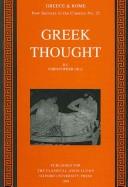
ISBN: 0199220743 9780199220748 Year: 1995 Volume: 25 Publisher: Oxford Oxford University Press
Abstract | Keywords | Export | Availability | Bookmark
 Loading...
Loading...Choose an application
- Reference Manager
- EndNote
- RefWorks (Direct export to RefWorks)
Philosophy --- Antiquity --- Greece --- Philosophy, Ancient. --- Philosophy, Ancient --- Ancient philosophy --- Greek philosophy --- Philosophy, Greek --- Philosophy, Roman --- Roman philosophy --- Civilization --- -Philosophy, Ancient --- -Philosophy --- Griechenland --- Grèce --- Hellas --- Yaṿan --- Vasileion tēs Hellados --- Hellēnikē Dēmokratia --- République hellénique --- Royaume de Grèce --- Kingdom of Greece --- Hellenic Republic --- Ancient Greece --- Ελλάδα --- Ellada --- Ελλάς --- Ellas --- Ελληνική Δημοκρατία --- Ellēnikē Dēmokratia --- Elliniki Dimokratia --- Grecia --- Grčija --- Hellada --- اليونان --- يونان --- al-Yūnān --- Yūnān --- 希腊 --- Xila --- Греция --- Gret︠s︡ii︠a︡ --- -Philosophie grecque --- Philosophie grecque
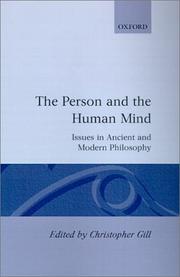
ISBN: 0198244606 Year: 1990 Publisher: Oxford Clarendon
Abstract | Keywords | Export | Availability | Bookmark
 Loading...
Loading...Choose an application
- Reference Manager
- EndNote
- RefWorks (Direct export to RefWorks)
Anthropologie philosophique --- Anthropology [Philosophical ] --- Antropologie [Filosofische ] --- Antropologie [Wijsgerige ] --- Filosofie van de mensheid --- Filosofische antropologie --- Homme (Philosophie) --- Homme -- Philosophie --- Homme [Philosophie de l' ] --- Human intelligence --- Intellect --- Intelligence --- Man (Philosophy) --- Mens (Filosofie) --- Menselijke natuur (Filosofie) --- Mind --- Nature humaine (Philosophie) --- Natuur [Menselijke ] (Filosofie) --- Philosophical anthropology --- Philosophie de l'homme --- Verstand --- Wijsgerige antropologie --- History --- Histoire --- 130.13 --- -Philosophical anthropology --- -#GROL:SEMI-13<09> --- Anthropology, Philosophical --- Civilization --- Life --- Ontology --- Humanism --- Persons --- Philosophy of mind --- Ability --- Psychology --- Mental retardation --- Thought and thinking --- Wijsgerige antropologie: persoon --- Philosophy --- 130.13 Wijsgerige antropologie: persoon --- Intellect. --- History. --- #GROL:SEMI-13<09> --- Philosophical anthropology. --- Philosophical anthropology - History. --- Intellect - History.
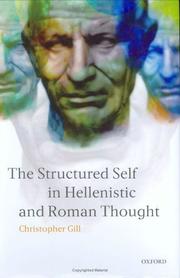
ISBN: 019815268X 019171013X 019956437X 9786610764525 0191518409 128076452X 1435618769 Year: 2006 Publisher: Oxford Oxford university press
Abstract | Keywords | Export | Availability | Bookmark
 Loading...
Loading...Choose an application
- Reference Manager
- EndNote
- RefWorks (Direct export to RefWorks)
Christopher Gill offers a new analysis of what is innovative in Hellenistic--especially Stoic and Epicurean--philosophical thinking about selfhood and personality. His wide-ranging discussion of Stoic and Epicurean ideas is illustrated by a more detailed examination of the Stoic theory of the passions and a new account of the history of this theory. His study also tackles issues about the historical study of selfhood and the relationship between philosophy and literature, especially the presentation of the collapse of character in Plutrarch's Lives, Senecan tragedy, and Virgil's Aeneid. As all Greek and Latin is translated, this book presents original ideas about ancient concepts of personality to a wide range of readers.
Filosofische antropologie. --- Zelf. --- Self (Philosophy) --- Philosophy, Ancient. --- Philosophical anthropology. --- Moi (Philosophie) --- Philosophie ancienne --- Anthropologie philosophique --- Self (Philosophy). --- Philosophical anthropology --- Philosophy, Ancient --- Philosophy --- Ancient philosophy --- Greek philosophy --- Philosophy, Greek --- Philosophy, Roman --- Roman philosophy --- Anthropology, Philosophical --- Man (Philosophy) --- Civilization --- Life --- Ontology --- Humanism --- Persons --- Philosophy of mind
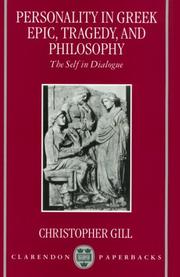
ISBN: 0198152329 0198146760 9780198152323 9780198146766 Year: 1998 Publisher: Oxford : Clarendon Press,
Abstract | Keywords | Export | Availability | Bookmark
 Loading...
Loading...Choose an application
- Reference Manager
- EndNote
- RefWorks (Direct export to RefWorks)
Personality in literature. --- Moi dans la littérature --- Personnalité dans la littérature --- Moi dans la littérature --- Personnalité dans la littérature --- Greek literature --- Self in literature. --- Epic poetry, Greek --- Greek drama (Tragedy) --- Philosophy, Ancient. --- History and criticism. --- Littérature grecque --- Poésie épique grecque --- Tragédie grecque --- Philosophie ancienne --- Histoire et critique --- History and criticism --- Self in literature --- Epic poetry [Greek ] --- Personality in literature --- Philosophy [Ancient ] --- Greek literature - History and criticism. --- Epic poetry, Greek - History and criticism. --- Greek drama (Tragedy) - History and criticism.

ISBN: 9780199564378 9780198152682 Year: 2009 Publisher: Oxford Oxford University Press
Abstract | Keywords | Export | Availability | Bookmark
 Loading...
Loading...Choose an application
- Reference Manager
- EndNote
- RefWorks (Direct export to RefWorks)

ISBN: 1280753706 0191555800 142378667X 9780191555800 0199264384 1383040605 Year: 2005 Publisher: Oxford New York Clarendon Press Oxford University Press
Abstract | Keywords | Export | Availability | Bookmark
 Loading...
Loading...Choose an application
- Reference Manager
- EndNote
- RefWorks (Direct export to RefWorks)
Christopher Gill explores key issues in ancient ethics in a way that highlights their conceptual significance for the study of ethics more generally.
Ethics, Ancient. --- Virtue. --- Conduct of life --- Ethics --- Human acts --- Ancient ethics
Book
ISBN: 9780198866169 019886616X Year: 2022 Publisher: Oxford : Oxford University Press,
Abstract | Keywords | Export | Availability | Bookmark
 Loading...
Loading...Choose an application
- Reference Manager
- EndNote
- RefWorks (Direct export to RefWorks)
At a time of unprecedented interest in Stoicism among scholars and the general public, this book offers a sustained examination of the core Stoic ethical claims and their significance for modern moral theory. The first part considers the Stoic ideas of happiness as the life according to nature and virtue as expertise in leading a happy life and explores the senses of 'nature' (both human and universal) relevant for ethics. The second part studies Stoic thinking on ethical development (learning to live naturally), bringing out the interconnections between growth in ethical understanding, forming social relationships, and emotional responses. The third part discusses how Stoic ethics, as interpreted here, can contribute to contemporary moral theory, especially virtue ethics. It suggests that Stoic thinking on the virtue-happiness relationship offers a cogent alternative to Aristotle, currently the main ancient prototype for virtue ethical theory, and it explores ways in which Stoic ideas on human and universal nature can contribute to modern ethical debates, notably on how to respond effectively to the pressing challenge of climate breakdown. It also highlights the value of Stoic guidance for virtue ethics as well as contemporary 'life-guidance'. A further distinctive feature of the book is the close and extended study of key sources for Stoic ethics, including Cicero's On Ends and On Duties, which enables readers of different kinds to interpret these source for themselves.
Stoïcisme --- Éthique appliquée. --- Développement durable --- Écologie humaine. --- Stoics. --- Ethics.
Article
Abstract | Keywords | Export | Availability | Bookmark
 Loading...
Loading...Choose an application
- Reference Manager
- EndNote
- RefWorks (Direct export to RefWorks)
| Listing 1 - 10 of 45 | << page >> |
Sort by
|

 Search
Search Feedback
Feedback About UniCat
About UniCat  Help
Help News
News